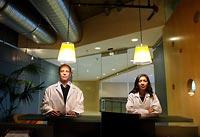Seattle biotech incubator helps another young fledgling to fly

Seattle biotechnology startup Allozyne closed on its first funding round only three weeks ago, but its scientists are already moving into state-of-the-art lab space.
Accelerator, the aptly named Seattle biotech incubator that's officially announcing Allozyne today, has made a franchise of quickly bringing promising science into development while freeing scientists from the more mundane burdens of launching a business.
"It saves me from doing the part of the job that I don't like to do," said Allozyne's chief scientific officer Kenneth Grabstein, a veteran of Corixa and Immunex.
The work Grabstein likes, in Allozyne's case, is developing a technology that could improve a range of protein-based drug therapies.
Several biotechnology products such as growth factors, monoclonal antibodies and interferons are based on proteins. Allozyne's technology modifies them by incorporating amino acids that don't naturally occur in proteins.
Allozyne aims to make the medicines faster, safer and more powerful.
"You can do a lot of interesting functions from protein that are normally not possible," said Deepshikha Datta, a founder and vice president who helped develop the technology as a post-doctoral student in the Materials and Process Simulation Center at California Institute of Technology.
That Allozyne was launched in Seattle might make sense to people familiar with Accelerator and its founder, Dr. Leroy Hood, who began his career at Caltech. But that's just a coincidence, Datta said.
Hood, president of the Institute for Systems Biology in Seattle, collaborated with some well-known names in venture capital on Accelerator, which offers select biotech startups lab space, technical support, access to top-notch science and financing.
Allozyne was introduced to the incubator by Chad Waite, managing director at OVP Venture Partners in Kirkland and an Accelerator board member. "We moved the technology from Pasadena to Seattle," he said.
Scott Carter, who handled the Allozyne licensing deal as assistant director in the Office of Technology Transfer at Caltech, said Accelerator is unique among biotechnology incubators he's seen.
"What Accelerator did is bring together money with the facilities and services that are provided," said Carter. Most incubators provide only the latter, he said.
Five of the six backers of Accelerator invested in Allozyne. They are Alexandria Real Estate Equities, Amgen Ventures, Arch Venture Partners, MPM Capital and OVP. The sixth is Versant Ventures.
Collectively, Accelerator investors have pumped nearly $17 million into five biotech startups since 2003. Some have invested individually in at least three more. In that time, there have been 10 first-round biotech venture deals in Washington, according to venture-capital research firm Venture One.
"When it comes to actually getting companies started in biotech in Seattle, we're the ones who are doing it," said Carl Weissman, Accelerator's president and CEO.
Accelerator is on track to meet its goal of launching seven or eight companies in four years, and it has $5 million remaining to do it. But that won't be the end of the line.
"Our intention is to make this an enduring entity that will continue to generate interesting companies here," Weissman said. "We're already talking to our investors about the next commitment."
Benjamin J. Romano: bromano@seattletimes.com

![]()
![]()
Accelerator
![]()
![]()
Nearly $17 million has been invested in five biotechnology startups at the Eastlake incubator since it was founded in 2003:
Allozyne
Funded: Oct. 14
Employees: 4
Research goal: Improved protein-based therapeutics through the addition of non-natural amino acids
Origin of technology: California Institute of Technology
Homestead Clinical
Funded: July 2004
Employees: 5
Research goal: Early detection of diseases, including cancer, through blood samples
Origin of technology: Institute for Systems Biology (Seattle)
Progress: Identified a "significant" number of biomarkers
Spaltudaq
Funded: November 2004
Employees: 2
Research goal: Faster discovery of promising drug candidates for autoimmune and inflammatory diseases
Origin of technology: Founder Johnny Stine
Progress: Isolated a number of antibodies to be developed against breast cancer
VLST
Funded: May 2004
Employees: 8
Research goal: Faster discovery of promising drug candidates for autoimmune and inflammatory diseases
Origin of technology: Founders Craig Smith and Steve Wiley, formerly of Immunex
Progress: 70 targets discovered; four advancing to preclinical development; raising a second funding round
VieVax
Funded: March 2004
Employees: 1
Research goal: Rapid development of vaccines against infectious diseases .
Origin of technology: Founder Greg Mahairas and co-discoverer Chris Minion of Iowa State University, which out-licensed the technology
Progress: Completed successful animal studies; evaluating strategic options